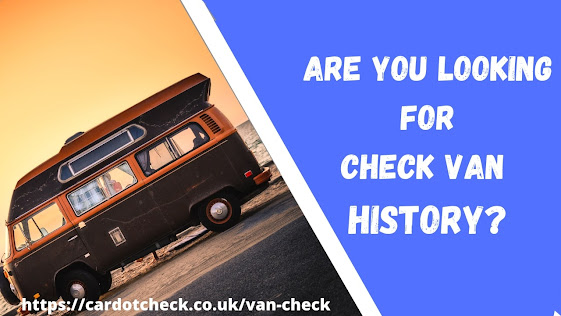Van history check
What to Look for When Purchasing a Used Van
Many
business owners in need of a vehicle will, unsurprisingly, opt to purchase a
used van to save money. However, purchasing the incorrect van can result in you
paying twice as much to replace or repair the vehicle. Fortunately, Van history check has put together this helpful information on
how to purchase a secondhand van. We've included advice on what to look for
both inside and out, where to buy from, and how to protect yourself during and
after the purchase.
Which pre-owned van should you go with?
First and foremost, you'll need to know what type of
vehicle you're looking for. This will most likely be determined by your
profession; a courier, for example, will almost certainly want a larger van
than a handyman. When determining which van to buy used, consider the following
factors:
Dimensions and storage space
Engine vigor
Fuel, insurance, tax, and other operating costs
Security
Payload limit
Additional features - Be careful not to overpay for a
vehicle by being attracted by fancy amenities you may never use.
Appearance - If you're buying a used van to run a
business, the appearance of your vehicle will be the first thing many consumers
notice!
Van Check list for Purchasing a
Used Van
One of the most crucial aspects of purchasing a used van
is making sure you thoroughly inspect every feature of it when you see it in
person. If you don't do all of the essential inspections before buying,
anything you overlooked could come back to bite you. Perform the following
visual checks on the vehicle before starting the engine:
Make sure the treads on your tires aren't worn down below
the 1.6mm road-legal barrier and that they're inflated evenly.
Examine the exterior of the vehicle for any scrapes,
cracks, or dents.
Interior: Look for cracks, dents, or wear and tear in the
van's interior that could indicate deeper problems while check van details.
Engine: If the van's engine is heated before it's
started, it could have major difficulties beneath the hood. Examine the oil
level and overall condition of the van to get an idea of how it has been
treated.
Mileage: If you're buying a used van, it's very crucial
to verify the mileage. If the mileage appears to be unusually low for the van's
age or condition, it could be a sign of tampering to hide underlying problems
with the vehicle.
Unexpected flickering or flashing lights could indicate a
problem with the van's electrics. On the other hand, dead bulbs are simple to
replace.
Where can I get a secondhand van?
There are several sites where you may buy a used van,
depending on your budget. Approved dealers, independent dealers, and
private/home dealers will all fall into one of three categories. Each has
advantages and disadvantages, so assess them all against your budget.




Comments
Post a Comment